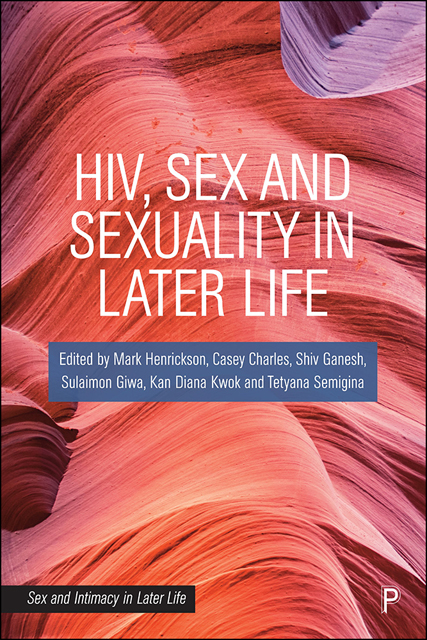Foreword: Dare we hope for the erotic? HIV/AIDS, sexuality and ageing
Published online by Cambridge University Press: 16 June 2023
Summary
I engage in interdisciplinary scholarship and research that focuses on Black queer and trans people, significations of HIV/AIDS and restrictions on blood donations from Black diasporic communities in Canada. I am particularly interested in the social life of blood donation and how ‘good’ donors are imagined. Primarily I focus on how anti-Black homophobia/white supremacist heteropatriarchy undergirds much of how we understand a safe blood supply.
What has been revealed in this research is the ways in which sex phobia and the moralistic limits of sexual intimacy stand in for ‘good’ and ‘effective’ donor protocols. Blood, in this instance, becomes part of what Foucault (1990) identifies as the science of social control, where those deemed as high risk are positioned as not only a social dilemma but also a medical dilemma. There is also a collaboration between the medical (public health) community and the media to support the carrier/vector narrative of HIV and AIDS, with delimited purported ‘high-risk’ communities.
About four years ago, I was in a researcher meeting with Canadian Blood Services, the blood operator in Canada. I was the only Black researcher attending the meeting. A senior medical employee of Canadian Blood Services spoke about why asking behaviour-focused questions was inappropriate, stating that asking a 72-year-old grandmother the last time she had anal intercourse was beyond the pale. This white employee literally placed her hand to her throat, as if clutching pearls, to convey the seemingly impossibility of such a practice. I hold this moment alongside two others that speak reflexively about ageing and sex.
The first is a moment in Yvonne Welbon’s (1999) biographical documentary, Living with Pride: Ruth C. Ellis @100, which recounts the life story of Ms Ruth Ellis as she celebrates her 100th birthday. Ruth Ellis was known at the time of her death as the oldest living Black lesbian. The film travels through various poignant moments of her life, providing an example of what old age could look like for queer and trans people. We see her attending dances, going camping, taking self-defence courses, visiting with friends and participating in political activism.
- Type
- Chapter
- Information
- HIV, Sex and Sexuality in Later Life , pp. xxi - xxviPublisher: Bristol University PressPrint publication year: 2022



